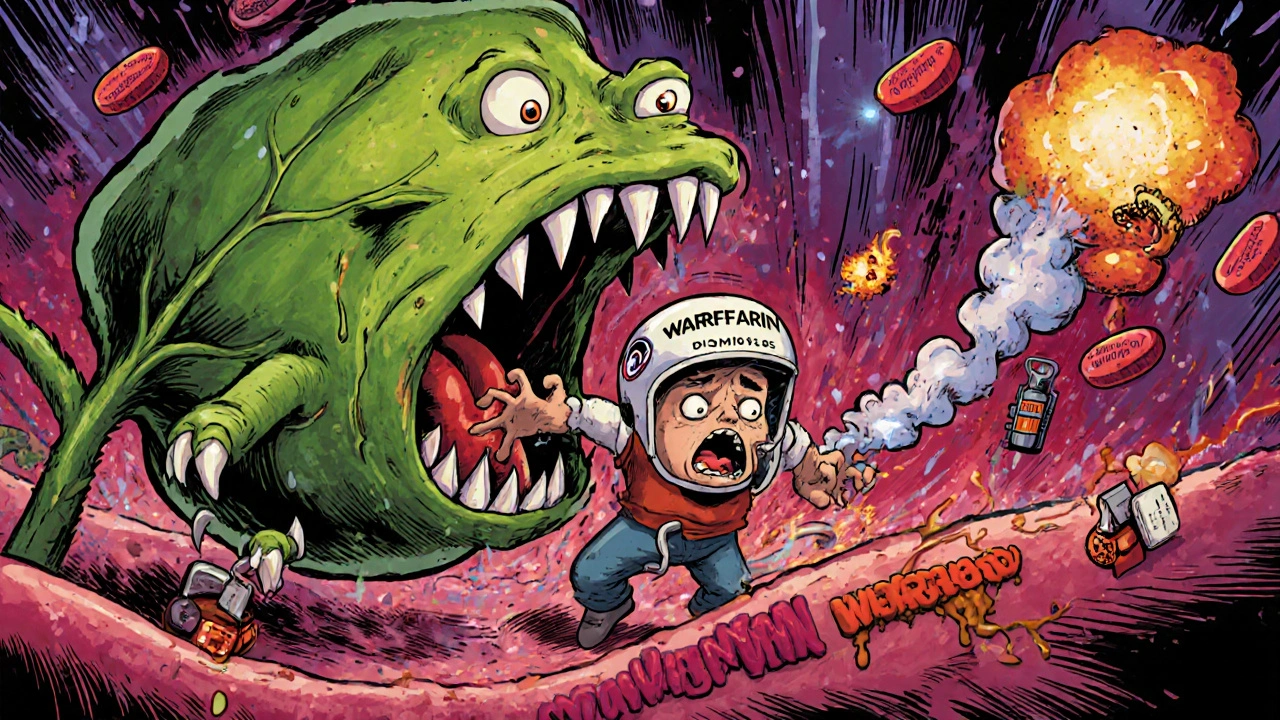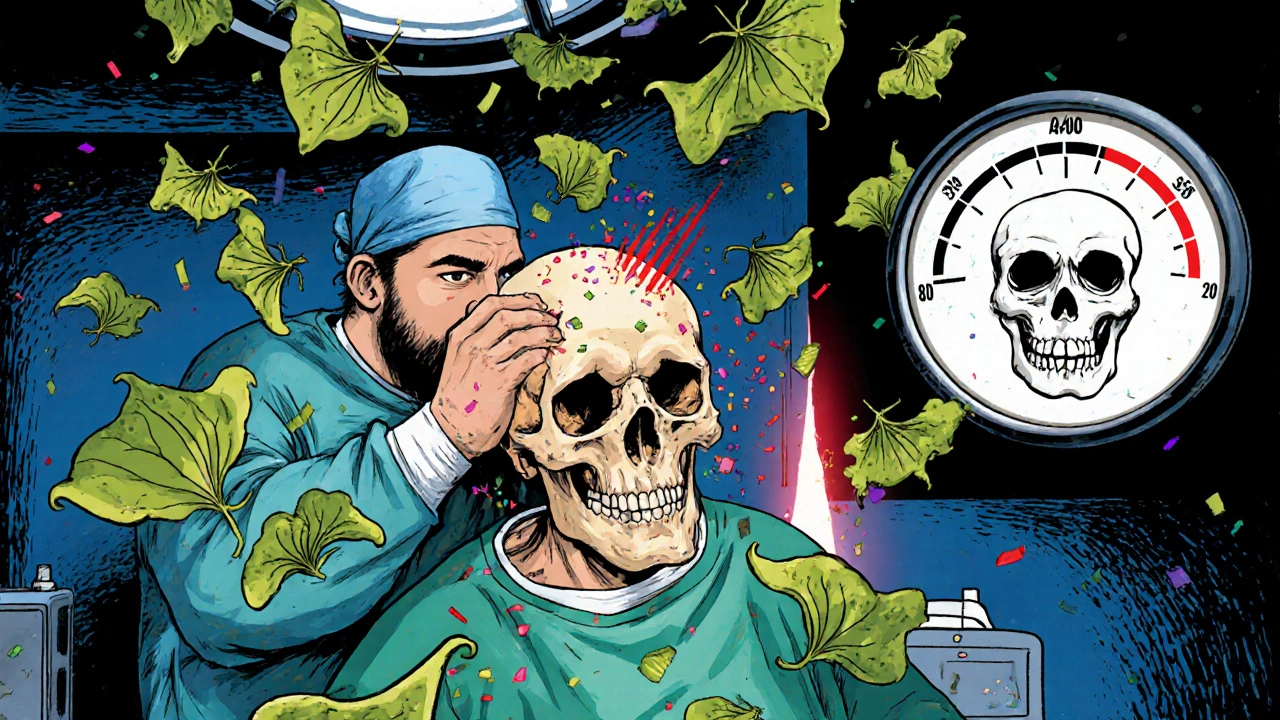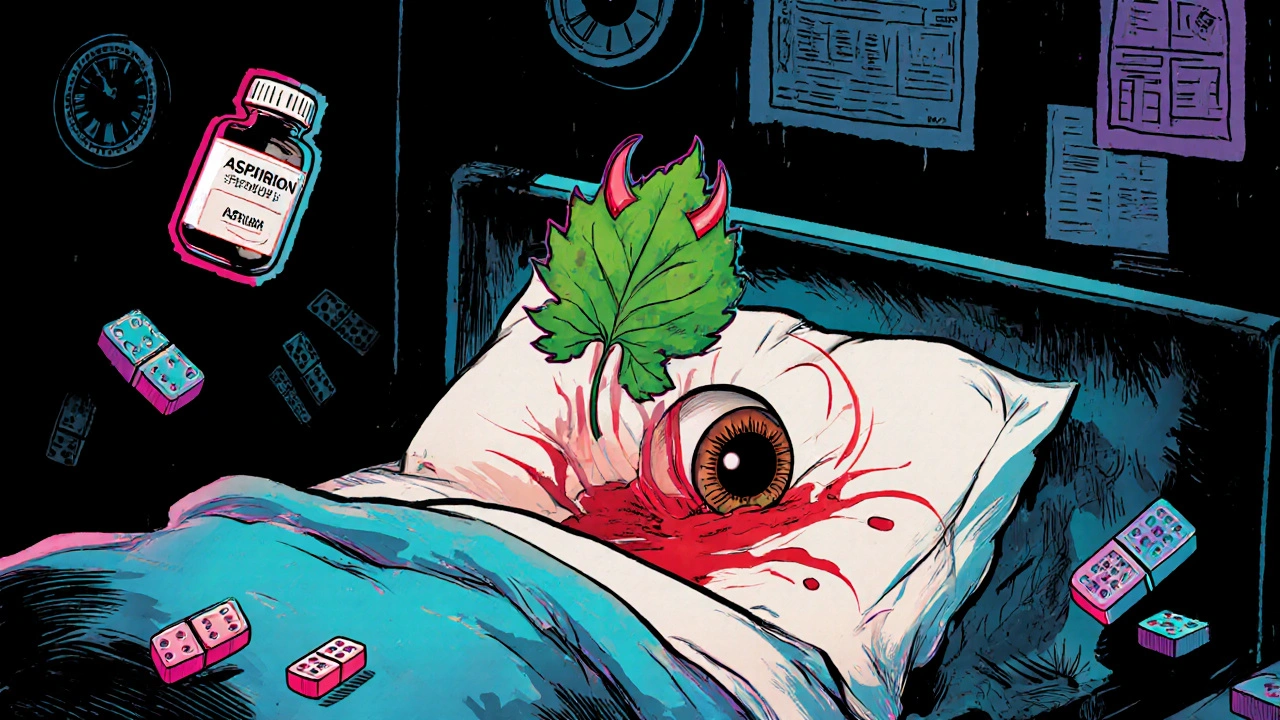Many people take Ginkgo Biloba hoping to boost memory or improve circulation. But if you’re on blood thinners, this popular herbal supplement could be hiding a serious danger: uncontrolled bleeding. It’s not just a theoretical risk. Real cases have happened - spontaneous eye bleeds, brain hemorrhages, and dangerous spikes in INR levels in people taking warfarin. And the problem isn’t just with prescription drugs. Even over-the-counter painkillers like ibuprofen or low-dose aspirin can turn Ginkgo Biloba into a ticking time bomb.
How Ginkgo Biloba Affects Your Blood
Ginkgo Biloba doesn’t work like aspirin or warfarin, but it does the same thing in practice: it makes your blood harder to clot. The active compounds - flavonoid glycosides and terpene lactones - interfere with platelet function and may reduce the activity of clotting factors. This sounds harmless until you cut yourself, get a bruise, or need surgery. Then, the lack of proper clotting becomes life-threatening.
Standard Ginkgo extracts contain 24% flavonoid glycosides and 6% terpene lactones. Most people take 120-240 mg daily. That’s the dose used in most studies. But here’s the catch: even at these "safe" levels, the risk doesn’t disappear. The American Society of Anesthesiologists says stop Ginkgo 2 to 3 weeks before any planned surgery. Why? Because bleeding during surgery can be catastrophic. And if you’re on blood thinners, your body is already playing a high-stakes game with clotting. Adding Ginkgo is like adding more fuel to the fire.
The Real-World Danger: Case Reports and Data
Science doesn’t always agree. One 2023 study in PLOS ONE found no clear evidence that Ginkgo Biloba (specifically EGb 761) inhibits clotting across 29 different lab tests. Sounds reassuring, right? But then look at the real-world data. That same study found a statistically significant link between Ginkgo use and bleeding events - especially when combined with clopidogrel, aspirin, or omeprazole. The odds of abnormal coagulation jumped by nearly 50%.
Then there are the case reports. A man in his 60s started taking Ginkgo for memory and low-dose aspirin for heart health. One week later, he woke up with blood in his right eye - no trauma, no injury. Just spontaneous bleeding. Another woman, taking Ginkgo for years without any other meds, suffered a brain hemorrhage. No warning. No prior symptoms. Just a sudden, life-threatening bleed.
And it’s not just warfarin. People taking ticagrelor, clopidogrel (Plavix), or even celecoxib (Celebrex) have reported increased bleeding risk. Even common drugs like omeprazole (Prilosec) and nifedipine (Procardia) can interact. The NIH warns that while bleeding incidents might not always be obvious, abnormal blood test results - like prolonged PT or INR - are common. That’s your body screaming for help before the bleeding starts.
Which Blood Thinners Are Most Dangerous With Ginkgo?
Not all blood thinners are created equal when mixed with Ginkgo. Here’s what you need to know:
- Warfarin (Coumadin, Jantoven): This is the big one. Ginkgo can push INR levels dangerously high. One patient’s INR jumped from 2.5 to 6.8 after starting Ginkgo - a level that puts you at high risk for internal bleeding.
- Clopidogrel (Plavix): An antiplatelet drug. Combined with Ginkgo, it can cause serious bruising, nosebleeds, or gastrointestinal bleeding.
- Aspirin (80-325 mg): Even low-dose aspirin, often taken for heart protection, increases bleeding risk when paired with Ginkgo. That’s why doctors warn against mixing them.
- NSAIDs like ibuprofen or naproxen: These are OTC, so people think they’re harmless. But with Ginkgo, they can cause stomach bleeds or kidney damage.
- Ticagrelor, etoricoxib, and others: These are less common, but case reports show they can trigger abnormal coagulation tests when taken with Ginkgo.
And here’s something many don’t realize: Ginkgo can also interfere with how your body handles other meds. It may reduce the effectiveness of antidepressants like fluoxetine (Prozac), statins like atorvastatin (Lipitor), and even diabetes pills. It can also raise blood pressure when mixed with decongestants like phenylephrine. That’s not just bleeding - that’s a whole cascade of risks.

Who Should Avoid Ginkgo Biloba Completely?
Some people should never take Ginkgo Biloba - no exceptions.
- Anyone on blood thinners: Prescription or OTC. If you’re on warfarin, aspirin, Plavix, or even daily ibuprofen, skip it.
- People with bleeding disorders: Hemophilia, von Willebrand disease, or even unexplained easy bruising - Ginkgo makes it worse.
- Older adults: Aging bodies process drugs slower. The risk of bleeding climbs with age, and so does the chance of drug interactions.
- Pregnant or breastfeeding women: Ginkgo may affect fetal circulation. No safe dose has been established.
- People with seizures or epilepsy: Ginkgo can lower the seizure threshold. If you’re on anticonvulsants, it might make them less effective.
And don’t think eating roasted Ginkgo seeds is safer. They’re toxic. They’ve caused vomiting, seizures, and even death in children. Stick to standardized extracts - if you take them at all.
What Should You Do If You’re Already Taking Both?
If you’re already taking Ginkgo and a blood thinner, don’t panic - but don’t ignore it either.
- Stop taking Ginkgo immediately. Don’t wait for symptoms. Bleeding doesn’t always come with warning signs.
- Talk to your doctor or pharmacist. Show them your full list of supplements and meds. Many doctors don’t ask about herbs - you have to bring it up.
- Get a blood test. Ask for PT, INR, and platelet count. Even if you feel fine, your blood may be telling a different story.
- Wait 2-3 weeks before any surgery. Even if your surgeon doesn’t ask, tell them you took Ginkgo. It’s your life on the line.
- Don’t restart without medical approval. Some people think "I’ll take less" or "I’ll take it every other day." That’s not safe. The interaction isn’t dose-dependent in a simple way.
There’s no "safe" way to combine Ginkgo and blood thinners. The evidence isn’t clear-cut, but the consequences are. One study said no risk. Another showed a 50% spike in abnormal clotting. Case reports show people bleeding out. When the stakes are brain bleeds and internal hemorrhages, you don’t gamble. You walk away.

Why This Problem Is Worse Than You Think
The supplement industry isn’t regulated like prescription drugs. The FDA doesn’t test Ginkgo Biloba before it hits shelves. One bottle might have the right dose. Another might be contaminated. Another might have no Ginkgo at all. A 2023 report from the National Center for Complementary and Integrative Health found that up to 30% of herbal supplements don’t match their labels.
And here’s the kicker: people rarely report side effects from supplements. Only 1 in 100 adverse events are reported to the FDA. That means for every case we know about, there are 99 we don’t. The real number of Ginkgo-related bleeds could be ten times higher than what’s documented.
Doctors aren’t always trained to ask about herbs. Pharmacists might not have the data. Patients assume natural means safe. That’s a deadly myth. Ginkgo Biloba is not harmless. It’s a pharmacologically active substance with real, documented risks. Calling it "natural" doesn’t make it safer - it makes it harder to track, study, and regulate.
What Are the Alternatives?
If you took Ginkgo for memory or circulation, what can you use instead?
- Exercise: Regular walking or swimming improves blood flow better than any herb. It’s free, proven, and has zero interaction risk.
- Omega-3s: Fish oil has mild blood-thinning effects too - but unlike Ginkgo, it’s well-studied and often recommended by cardiologists for heart health.
- Healthy diet: Leafy greens, berries, nuts, and whole grains support circulation without interfering with medications.
- Cognitive training: If you’re after memory, try puzzles, learning a new skill, or social engagement. These are backed by decades of research.
No supplement replaces these. And none of them carry the same bleeding risk.
Final Advice: When in Doubt, Skip It
Ginkgo Biloba isn’t worth the risk if you’re on blood thinners. The science is messy. The cases are real. The consequences are irreversible. You don’t need to prove it doesn’t work - you just need to know that it can kill you.
Don’t assume your doctor knows you’re taking it. Don’t assume your pharmacist checked for interactions. Don’t assume "natural" means safe. The supplement industry doesn’t care if you bleed. Your body does.
If you’re on warfarin, aspirin, Plavix, or any other blood thinner - stop Ginkgo. Talk to your provider. Get tested. Choose proven, safe alternatives. Your next heartbeat shouldn’t depend on a bottle you bought online.
Can I take Ginkgo Biloba if I’m on low-dose aspirin?
No. Even low-dose aspirin (80-325 mg) increases bleeding risk when combined with Ginkgo Biloba. Case reports show spontaneous bleeding in people taking both. The combination affects platelet function and can lead to serious internal bleeding. Stop Ginkgo if you’re on aspirin.
How long should I stop Ginkgo before surgery?
The American Society of Anesthesiologists recommends stopping Ginkgo Biloba 2 to 3 weeks before any elective surgery. While some studies suggest 36 hours might be enough, the 2-3 week window is the safest standard. Bleeding during surgery can be fatal - don’t risk it.
Does Ginkgo Biloba interact with warfarin?
Yes. Multiple case reports show Ginkgo Biloba can significantly raise INR levels in people taking warfarin. One patient’s INR jumped from 2.5 to 6.8 after starting Ginkgo - a level that puts you at high risk for internal bleeding. Always inform your doctor if you’re taking both.
Is Ginkgo Biloba safe for older adults?
No. Older adults are at higher risk for bleeding due to slower drug metabolism and more frequent use of blood thinners. Mayo Clinic advises older adults, especially those with bleeding conditions, to avoid Ginkgo entirely. The risk outweighs any unproven benefits.
Can I take Ginkgo Biloba if I have high blood pressure?
Be cautious. Ginkgo may interfere with blood pressure medications like nifedipine. It can also raise blood pressure if taken with decongestants like phenylephrine. If you have hypertension, talk to your doctor before taking Ginkgo - it’s not a safe choice for most people with high blood pressure.
Are there any safe herbal alternatives to Ginkgo for memory?
Yes. Exercise, cognitive training, and a diet rich in omega-3s, berries, and leafy greens are proven to support brain health without drug interactions. No herbal supplement has been shown to reliably improve memory better than these lifestyle changes - and none carry the bleeding risk of Ginkgo.
Why do some studies say Ginkgo doesn’t cause bleeding?
Some lab studies, like the one on EGb 761 extract, found no effect on 29 coagulation markers. But those are controlled lab tests - they don’t reflect real-world use. Real people take Ginkgo with other drugs, have different genetics, and take varying doses. Case reports and population studies show bleeding happens. The absence of evidence isn’t evidence of absence.
Should I tell my pharmacist I’m taking Ginkgo Biloba?
Absolutely. Pharmacists are trained to spot dangerous interactions. Most won’t ask unless you tell them. Bring your supplement bottle to the pharmacy when picking up prescriptions. It could save your life.


Comments
David Cunningham
November 24, 2025 AT 11:59Man, I took ginkgo for months thinking it was just a "natural brain boost". Didn’t realize it was basically a silent blood thinner. Scary stuff. I stopped cold after reading this. No regrets.
Jessica Correa
November 25, 2025 AT 15:54My dad was on warfarin and started ginkgo for memory and never told his doctor. He ended up in the ER with a huge bruise on his thigh and an INR of 7. They had to give him vitamin K. He’s fine now but he won’t touch herbs again. Always tell your doctor.
luke young
November 27, 2025 AT 06:40I get why people take it. I used to take it too. Feels like a harmless little boost. But this post laid out the real risks so clearly. No more guessing. I’m done with ginkgo. Exercise and sleep are way safer anyway.
Rahul Kanakarajan
November 28, 2025 AT 21:22Wow. So you’re telling me people are risking brain bleeds because they want to remember where they put their keys? This is why America’s dying. Stop taking supplements and start using your brain.
ann smith
November 30, 2025 AT 09:27Thank you for writing this. I’ve been on Plavix for years and didn’t know ginkgo was a danger. I’m so glad I read this before my knee surgery next month. I’ll stop it today. You saved me from a nightmare. 🙏
james lucas
December 1, 2025 AT 07:40ok so i just wanna say i took ginkgo for like 2 years with low dose aspirin and never had a problem but i guess that doesnt mean its safe for everyone. like i know some people get way more sensitive to stuff. i just stopped it anyway cause why risk it. my grandma used to say better safe than sorry and she lived to 98 so i trust her. also i think the part about the label not matching the contents is wild. like how do you even know what youre taking?
New Yorkers
December 1, 2025 AT 17:03Let’s be real. The supplement industry is a cult. Ginkgo isn’t medicine. It’s a placebo wrapped in marketing and sold by people who think "natural" means "immune to physics". You don’t need a herb to improve memory. You need sleep, hydration, and not scrolling TikTok for 8 hours a day. The real danger isn’t the ginkgo - it’s the delusion that a pill can fix a broken lifestyle.
manish chaturvedi
December 2, 2025 AT 07:36In India, we’ve used Ginkgo in Ayurveda for centuries, but always under supervision and never mixed with anticoagulants. This post is spot on. Natural doesn’t mean harmless. In fact, the most dangerous poisons in history came from plants. Respect the chemistry. Your body doesn’t care if it’s from a tree or a lab - it reacts the same. Talk to your doctor. Always.